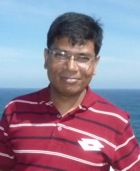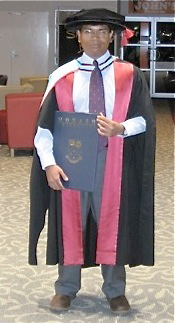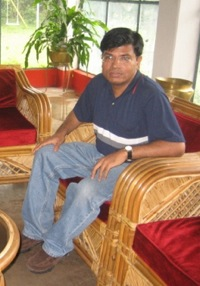 Arifur Rahman Khan, Bangladesh
Arifur Rahman Khan, Bangladesh
Lecturer in Accounting, Deakin University, Melbourne, Australia
Public Policy Program (’04/’05)
What is your area of specialization and how did you come to work in this area?
My area of specialization is accounting. My PhD at Monash University concentrated on accounting and finance. My doctoral thesis titled ‘Managerial share ownership, firm performance and dividends: Australian evidence’ investigates how managerial ownership, as an internal corporate governance mechanism, impacts upon firm performance and dividends.
At present I am working as a lecturer in accounting in the School of Accounting, Economics and Finance, Deakin University, Melbourne. I teach mainly financial accounting and management accounting related units. I have research interest in the area of capital market. In particular, my research focuses on corporate governance, earnings quality, firm performance and payout policies.
Actually I studied accounting since I wanted to be a professional accountant. However, I chose academia after I was inspired by some scholars of my department.
Have you always wanted to pursue a career in academia? What attracts you most about it?
I initially thought that I would be a professional accountant. I therefore, studied accounting at the undergraduate level. Actually most of the students studying accounting always dream to develop their career in the industrial sector and I was not an exception.
I feel myself very lucky since I was the direct student of some renowned scholars like Professor Habibullah, Professor Mustafizur Rahman and Professor Reazur Rahman  Chowdhury of the Department of Accounting and Information Systems. After attending their lectures I began to realise that accounting could be a very interesting area of research and became highly motivated to pursue my career in academia. Gradually I started to realise the challenging life of a researcher. I could apprehend that research in accounting could help me to improve my analytical skill and critical way of thinking. To me the most attractive thing in academia is that an academic can work in an autonomous fashion and think in a pragmatic way to address his/her research question.
Chowdhury of the Department of Accounting and Information Systems. After attending their lectures I began to realise that accounting could be a very interesting area of research and became highly motivated to pursue my career in academia. Gradually I started to realise the challenging life of a researcher. I could apprehend that research in accounting could help me to improve my analytical skill and critical way of thinking. To me the most attractive thing in academia is that an academic can work in an autonomous fashion and think in a pragmatic way to address his/her research question.
What are some of the biggest challenges you face in your work and what has been the most rewarding aspect of your career thus far?
It is very important for the academics to publish their works. Therefore, to me the biggest challenge in my work is to publish the findings of my research project in high quality academic journals. Additionally obtaining research grants is also very challenging and competitive.
What was the most important thing you learned while at GRIPS? How did your experience at GRIPS prepare you for future endeavours?
Although my previous academic background was in accounting, I studied a little bit of economics while I studied in the University of Dhaka. During my studies at GRIPS I had the opportunity to learn more about economics. In particular, I have to mention the name of courses such as public economics, monetary economics, international economics, development economics and econometrics. The econometrics course was the most helpful for me. In my research I have to use a number of econometric models and I must admit that I have been able to develop my foundation in econometrics after attending Professor Pfau’s econometric course. My knowledge and experience of that course helped me a lot during my doctoral research at Monash University.
Having studied at both Japanese and Australian universities, how do you compare these experiences? Can you say something about the differences in (academic) culture, teaching methods, values, attitudes etc.?
I found some differences between Japanese and Australian universities in terms of cultural aspects. Sometimes classroom environment is very formal in the Japanese universities. It seems to me that professors in Japanese universities are like the guardians. They treat their students as their own children. I noticed that academics in the Australian universities are very informal. Students are always encouraged to participate in the class. They are given extra marks for class participation. Their opinion is appreciated in the classroom. I think Australian universities are learner-centred rather than teacher-centred.
Professors in Australian universities treat the students as their mates. On the very first day when I met my main supervisor, he asked me to address him by his first name. His main objective was to treat me like his mate. It was a big surprise for me since I did not experience such thing at GRIPS. Later I realised that it is very common in the Australian academic environment. During my PhD at Monash I noticed that joint supervision is very common over there in Australia since they encourage participation and sharing of knowledge. My PhD supervisors always encouraged me to argue with them on my research. I worked on my research project with my two supervisors like a team.
I must admit that both Japanese and Australian universities are always concerned about student needs and interests and offer an excellent education, which aims at developing analytical thinking and individual initiative and responsibility. Their ultimate objective is common: to produce competent and skilled graduates who can be of immediate benefit to society, contributing to its development and well-being.
If you could choose another profession to be in, what would it be?
I enjoy cooking and I would probably try to become a master chef.
What is your fondest memory of your time spent in Japan?
International student parties, visit to Toyota motor plant, field trip to Kyoto by ‘shinkansen’, Mount Fuji, and courses taught by Professor Pfau, Professor Ohno, Professor Kalirajan and Professor Hashimoto.
What do you miss about Japan?
Sushi, tempura, the Yurikamome automated train, the ferris wheel at Odaiba, Sakura festivals.
What is your favorite thing to do when you are not working?
I read newspapers and listen to music during my leisure.
How do you maintain a balance between your work and the rest of your life?
Actually it is not very easy for the academics to maintain a balance between work and rest of life. Sometimes they may have to bring work home to meet the deadlines. I always try to plan my work properly and meet the deadlines relating to research. I try not to work over the weekend.
What advice would you give to current GRIPS students?
I would suggest you to make a balance between your academic and social life. Apart from your studies there are many things to explore and know about Japan. Please go out and explore the country and learn about Japan as much as you can.





